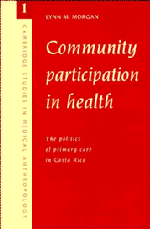Book contents
- Frontmatter
- Contents
- List of illustrations
- List of tables
- Acknowledgments
- List of abbreviations
- 1 The political symbolism of health
- 2 Banana medicine: the United Fruit Company in Costa Rica
- 3 The international imperative: foreign aid for health in Costa Rica
- 4 The primary health care movement and the political ideology of participation in health
- 5 Participation in Costa Rica: dissent within the state
- 6 La Chira: participation in a banana-growing community
- 7 The political economy of participation
- References
- Index
1 - The political symbolism of health
Published online by Cambridge University Press: 29 January 2010
- Frontmatter
- Contents
- List of illustrations
- List of tables
- Acknowledgments
- List of abbreviations
- 1 The political symbolism of health
- 2 Banana medicine: the United Fruit Company in Costa Rica
- 3 The international imperative: foreign aid for health in Costa Rica
- 4 The primary health care movement and the political ideology of participation in health
- 5 Participation in Costa Rica: dissent within the state
- 6 La Chira: participation in a banana-growing community
- 7 The political economy of participation
- References
- Index
Summary
Over the last century doctors and public health authorities have gradually asserted their control over the domain of health and medicine in most of the Western world. Since the mid-1970s and the advent of the primary health care movement, however, health planners have ostensibly been trying to reverse this trend, to give back to ordinary citizens some of the responsibility for maintaining health. Promotion of community participation in health, one component of primary health care, has been particularly important in this new strategy. Proponents of community participation envisioned self-motivated rural communities working together with the state to design their own programs to improve health and development. This grand vision has proven difficult to achieve in practice, however, particularly in countries and regions without an existing tradition of joint community-government cooperation.
Costa Rica is a small, Central American country with an international reputation for high standards of public health. In the 1970s, when the Costa Rican government began an ambitious program to extend health services to rural areas, many observers were optimistic about the prospects. They felt that if primary health care and community participation were going to succeed anywhere in Latin America, they would succeed in Costa Rica because of the state's democratic tradition and history of commitment to health care. Community participation was a key feature of the government's primary health care programs between 1973 and 1985, when four different administrations tried, in varying degrees, to promote participation in health. The program flourished, briefly, between 1978 and 1982 under the administration of President Rodrigo Carazo.
- Type
- Chapter
- Information
- Community Participation in HealthThe Politics of Primary Care in Costa Rica, pp. 1 - 16Publisher: Cambridge University PressPrint publication year: 1993



